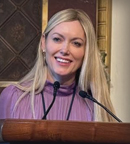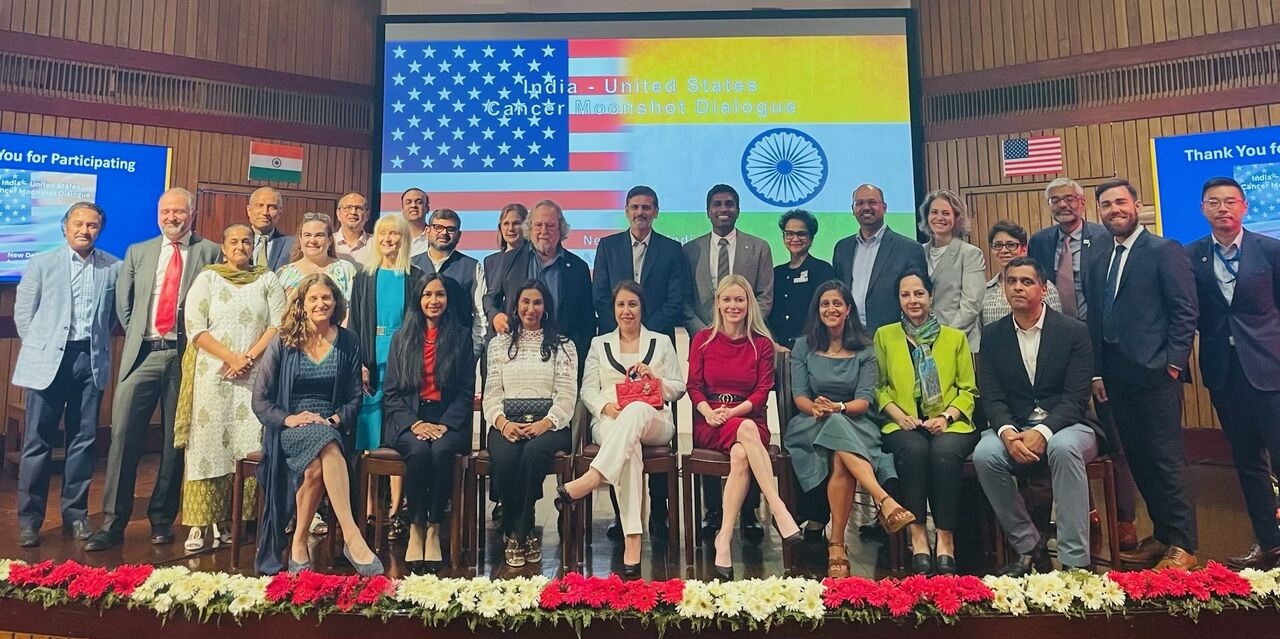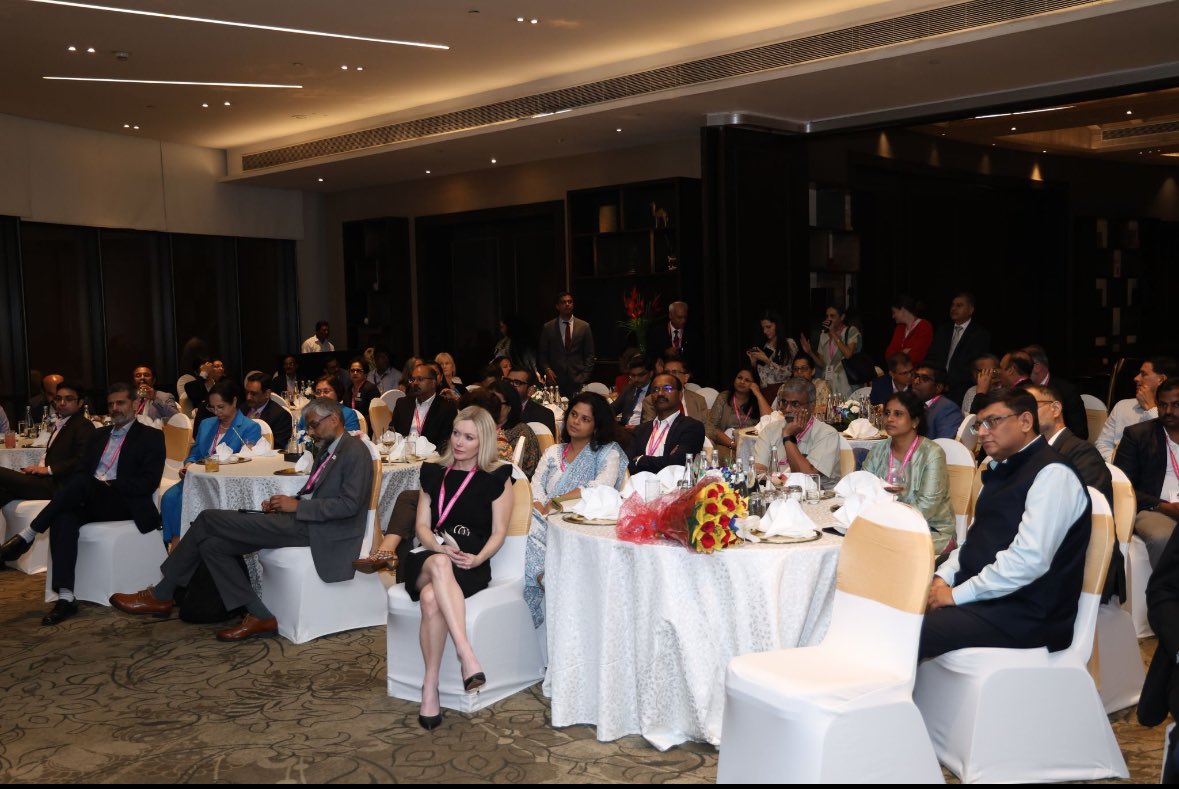Catharine Young, PhD, has spent the past decade of her career focused on cancer policy and advocacy. A native of Johannesburg, South Africa, Dr. Young served as Senior Director of Science Policy at the Biden Cancer Initiative, which began in 2017 by then former Vice President Joe Biden. There she led efforts to bring together the fields of biotechnology, science, and academia to drive innovation and breakthroughs in cancer research and later worked to advance policy reform in rare cancers.
After earning a doctorate degree in biomedical science from the University of Missouri and completing postdoctoral training at Cornell University in biomedical engineering, Dr. Young served as a policy fellow in the Office of the Assistant Secretary of Defense for Nuclear, Chemical, and Biological Defense Programs at the U.S. Department of Defense, where she helped lead international efforts to eliminate biological weapons, improve biosecurity, and establish biosurveillance capacity. She also assisted in the Department of Defense’s response to the Ebola outbreak in Western Africa during the Obama administration and was a science and innovation policy advisor to UK Ambassador Kim Darroch, based at the British Embassy in Washington, DC.

Catharine Young, PhD

Chandrakanth Are, MBBS, MBA, FSSO, FRCS, FACS
Dr. Young was Assistant Director for Cancer Moonshot Policy and International Engagement at the White House Office of Science and Technology Policy during the Biden administration. Chandrakanth Are, MBBS, MBA, FSSO, FRCS, FACS, Jerald L. and Carolynn J. Varner Professor of Surgical Oncology and Global Health at the University of Nebraska Medical Center and Chief Executive Officer of the Global Forum of Cancer Surgeons, sat down with Dr. Young to discuss the progress being made against cancer both domestically and worldwide, the importance of strengthening alliances with the global community to reduce the burden of cancer, and pivotal moments in her career. Their conversation has been edited for length and clarity.
A Front-Row Seat to History
Dr. Are: You have a fascinating personal background of growing up in apartheid South Africa, which ended in the early 1990s. You have had a front-row seat to such an important time in history. How did growing up in South Africa at this important juncture impact your career choices, especially in oncology?
Dr. Young: I am not an oncologist, but science has always been at the center of my career trajectory. I have focused on leveraging science and technology to drive innovation whether through my work at the Department of Defense or as a science advisor for former British Ambassador Kim Darroch at the British embassy in Washington, DC.
My interest in cancer research and advocacy emerged as a result of my role as Senior Director of Science Policy at the Biden Cancer Initiative, which ultimately led me to my position at the White House Office of Science and Technology Policy.
One of my most pivotal childhood memories growing up in Johannesburg was witnessing Nelson Mandela elected President of South Africa in 1994. Seeing the dismantling of apartheid firsthand instilled in me the importance of resilience and the collective action that is necessary to overcome challenging systemic racism and inequality. And it has been a personal driver in my career choices, including my work in cancer advocacy.
My journey from South Africa to the United States has allowed for this intersection of science policy and cancer advocacy, which led me to my work on the Cancer Moonshot.
Ensuring Equitable Cancer Care for All Patients
Dr. Are: What is your opinion about the progress being made in cancer care in the United States?
Dr. Young: Certainly, there has been immense progress over the past half century in cancer care since the enactment of the National Cancer Act of 1971; we’ve seen steady decreases in cancer mortality rates as a result. According to the latest report from the American Cancer Society, cancer mortality has declined by 34% from 1991 to 2022 in the United States.1 However, cancer remains the second leading cause of death after heart disease, and this year, the American Cancer Society is projecting nearly 2 million new cases of cancer and about 609,400 deaths from the disease,2 so clearly we have more work to do.
We are also still seeing significant disparities in cancer. For example, Black individuals face the highest death rate and shortest survival of any racial/ethnic group for most cancers.3 In addition, those living in rural communities have lower rates of new cancer cases and experience higher death rates than those living in urban areas.4
So, although we are seeing so much progress in cancer, we are beginning to understand that even with the Cancer Moonshot, which is endeavoring to advance research to reduce the cancer death rate by 50% over the next 25 years and end cancer as we know it, we won’t get there unless everyone has equal access to high-quality cancer care—not just here but around the world as well. If we don’t make cancer more equitable and accessible, which is the main driver of the Biden Cancer Moonshot, we will have failed at our job and for all of the patients and their families who are depending on us.
“If we don’t make cancer more equitable and accessible..., we will have failed at our job and for all of the patients and their families who are depending on us.”— CATHARINE YOUNG, PhD
Tweet this quote
In 2023, the Centers for Medicare and Medicaid Services released its final rule for the 2024 Medicare Physician Fee Schedule, which finalized a new reimbursement code for patient navigation services for people with serious illnesses, including cancer. And this past year, the Biden Cancer Moonshot announced the expansion of coverage for patient navigation services from several health insurers, as well as actions comprehensive cancer centers and community oncology practices are taking to help patients get reimbursed for these services.
We know that patient navigation services improve outcomes for patients with cancer, so this expanded coverage was an important step forward in supporting patients.
Expanding the Goals of the Cancer Moonshot Globally
Dr. Are: The World Health Organization is predicting more than 35 million new cases of cancer in 2050, a 77% increase from the estimated 20 million cases in 2022, with the most striking proportional increase in incidence and mortality occurring in low- and middle-income countries.5 What are your thoughts on the global burden of cancer?
Dr. Young: There are so many issues hindering progress in cancer care in low-resource countries, including inadequate health-care funding and infrastructure to develop and implement early detection, diagnosis, and adequate basic treatment. Oncology workforce shortages, drug supply chain problems, and geopolitical instability also pose significant challenges.
However, the global community is rallying its resources to help develop new approaches to harness technologic advancements, foster aligned partnerships, and implement targeted strategies, and we see momentum building, but there is a long way to go.
Although the immediate goals of the Biden Cancer Moonshot are domestic, focused on preventing more than 4 million cancer-related deaths by 2047 and improving the experience of people who are touched by cancer, our work to end cancer as we know it also extends beyond our borders. We are seeking to mobilize the global cancer community under a Global Cancer Moonshot. Over the past year, we have seen a number of countries, including experts in the UK, European Union, Japan, India, and the Republic of Korea, engage with us to make global progress in cancer care.
“The global community is rallying its resources to help develop new approaches to harness technologic advancements, foster aligned partnerships, and implement targeted strategies.”— CATHARINE YOUNG, PhD
Tweet this quote
And even earlier than that, in 2022, President Biden convened the U.S.-Africa Leaders’ Summit held in Washington, DC, which was attended by the heads of 49 African countries. Our work in Africa continued when in July 2024, the Biden Cancer Moonshot, in collaboration with the U.S. State Department, hosted the White House Africa Cancer Care Forum, bringing together representatives from 10 African nations to address cancer care priorities across the continent. This forum underscored the U.S. commitment to global health by announcing more than $100 million in new initiatives aimed at reducing the cancer burden in Africa, bringing our total commitment to date to over $400 million.
Most recently, in September 2024, President Biden hosted the Quad heads of state from Australia, Japan, and India in Wilmington, Delaware, and announced the launch of the Quad Cancer Moonshot. The collective goal of this initiative is the elimination of cervical cancer, caused by the human papillomavirus, in collaboration with Indo-Pacific partners, through increased access to vaccines, screening, and treatment. We are thrilled now to have this blueprint in place to help other countries come together around prevention and screening approaches and more effective treatment of cervical cancer. This is a great model that will, hopefully, be replicated in other regions of the world.
Improving the Health of the Global Community
Dr. Are: I was privileged to attend another successful summit you held, the first-ever U.S-India Cancer Moonshot Dialogue in New Delhi, on August 5–6, 2024. Please talk about the focus of that meeting.
Dr. Young: Yes, it was an amazing event, and I’m grateful you could be there, along with so many leaders in global health and global cancer, including Nobel Laureate Jim Allison, PhD, who presented a scientific lecture on “Beyond Checkpoint Inhibition.” The dialogue raised attention on cancer, strengthening U.S.-India biomedical research cooperation, and developing solutions to improve the health of the global community.
We brought together participants from each of the two governments, including the U.S. delegation (Figure 1), senior officials of the Government of India, leaders from the American and Indian private sectors, nongovernmental organizations, and patient advocacy groups in cancer-related fields, among others (Figure 2). We felt there was so much power in bringing these two countries together to supercharge progress in cancer cures, so there was an immense amount of enthusiasm and dedication from the participants.

FIGURE 1—U.S. delegation to the first-ever U.S-India Cancer Moonshot Dialogue in New Delhi, on August 5–6, 2024.

FIGURE 2—Participants at the U.S-India Cancer Moonshot Dialogue.
The goal of the U.S.-India Cancer Moonshot Dialogue is to accelerate cooperation and collaboration around several critical areas, including the development of artificial intelligence to innovate cancer care; novel therapeutics to improve cancer outcome; cost-effective equitable cancer therapy to ensure that all patients with cancer have access to quality care; increasing access to cancer clinical trials in India; and building a holistic and integrative approach to cancer management and survivorship.
Fulfilling the Mission of the Cancer Moonshot
Dr. Are: You have had some amazing moments during your time as Assistant Director for Cancer Moonshot Policy and International Engagement at the White House Office of Science and Technology Policy in developing initiatives that impact the whole country. Can you tell us more?
Dr. Young: I have had so many memorable moments in my position. If I have to pick one, I would say it was being in the room when President Biden and First Lady Dr. Jill Biden announced the reignition of the Cancer Moonshot, on February 2, 2022. I distinctly remember feeling an incredible amount of hope for the country and for the millions of patients with cancer and cancer survivors, and I have never lost that sense of hope. It is something I carry with me every day.
It has also been such an honor and privilege to work with President Biden and Dr. Jill Biden. They are 100% committed to ending cancer as we know it. Their dedication and commitment to improving the lives of cancer survivors and their families are inspiring.
Working for the Biden Cancer Moonshot has been a privilege and one of the most impactful and rewarding experiences of my career. I feel so incredibly fortunate and lucky to work with amazing people who have dedicated their entire careers to improving the lives of people touched by cancer.
We have no choice but to fulfill the mission of the Cancer Moonshot to prevent more than 4 million cancer deaths by 2047 and to improve the experience of people living with this disease. This is my personal mission, too.
DISCLOSURE: Dr. Are has a patent with the University of Nebraska Medical Center for a laparoscopy instrument. Dr. Young reported no conflicts of interest.
REFERENCES
1. American Cancer Society: 2024—First year the US expects more than 2M new cases of cancer. Available at www.cancer.org/research/acs-research-news/facts-and-figures-2024.html. Accessed February 10, 2025.
2. American Cancer Society: Cancer Facts & Figures 2022. Available at www.cancer.org/research/cancer-facts-statistics/all-cancer-facts-figures/cancer-facts-figures-2022.html#:~:text=The%20Facts%20%26%20Figures%20annual%20report,deaths%20in%20the%20United%20States). Accessed February 10, 2025.
3. American Cancer Society: Cancer disparities in the Black community. Available at www.cancer.org/about-us/what-we-do/health-equity/cancer-disparities-in-the-black-community.html. Accessed February 10, 2025.
4. Centers for Disease Control and Prevention: Cancer in rural America. Available at www.cdc.gov/rural-health/php/public-health-strategy/public-health-considerations-for-cancer-in-rural-america.html#:~:text=Cancer%20is%20the%20second%20leading%20cause%20of%20death%20in%20the%20United%-
20States.&text=Compared%20to%20urban%20areas%2C%20rural,cancer%20death%20rate%20is%20higher. Accessed February 10, 2025.
5. World Health Organization: Global cancer burden growing, amidst mounting need for services. Available at www.who.int/news/item/01-02-2024-global-cancer-burden-growing--amidst-mounting-need-for-services. Accessed February 10, 2025.

